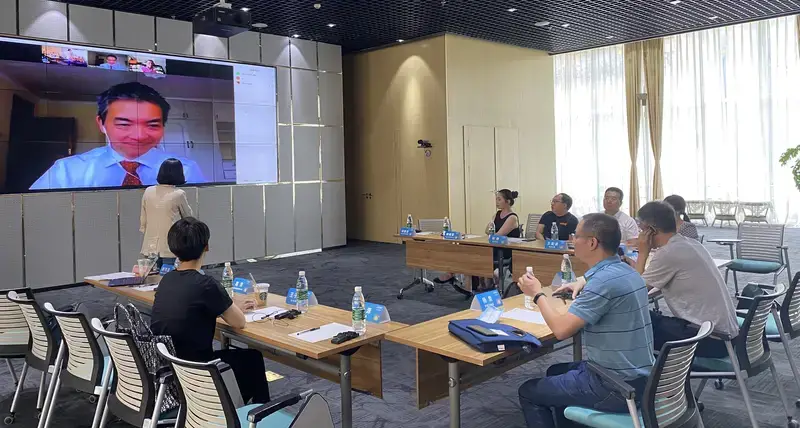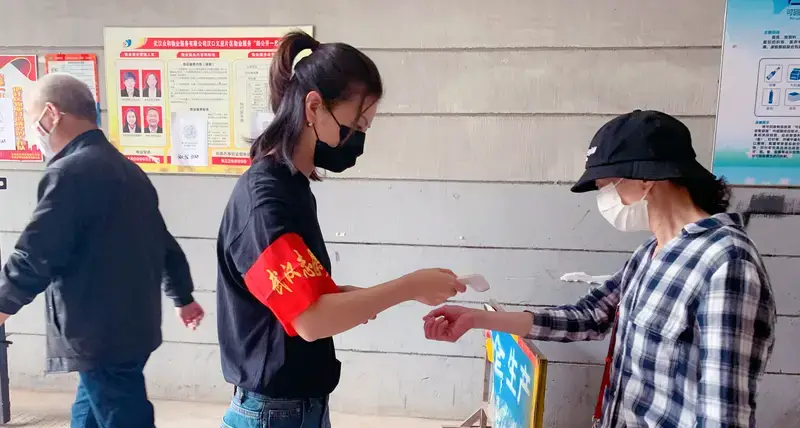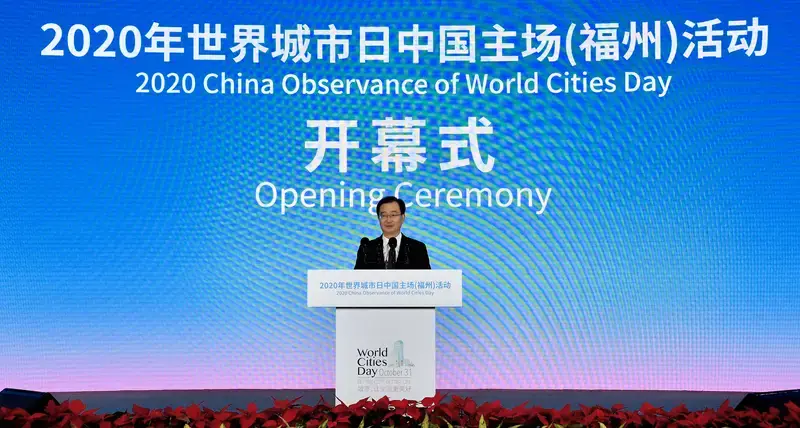Since 1992, UN-Habitat has collaborated with the Government of the People’s Republic of China to promote housing and sustainable urbanization. China has supported UN-Habitat with information dissemination on the outcomes of the Habitat II and Habitat III conferences and on other relevant issues. The fourth World Urban Forum was held in Nanjing in 2008, under the theme of harmonious urbanization and balanced territorial development. The Government of China and Shanghai called for the establishment of the yearly World Cities Day in 2014, as a UN Day. UN-Habitat engages in China under a Framework of Cooperation with the Ministry of Housing and Urban-Rural Development. The UN-Habitat China office has collaborations with national agencies and cities in China, on urban planning and design, urban public space, regeneration, heritage, smart cities, rural revitalization and other topics. UN-Habitat engages with Chinese partners on diagnostic studies on the spatial challenges of metropolitan cities and neighbourhoods and promotes participatory planning and design tools. It cohosts national and international meetings, from Expert Group Meetings on a variety of specialized topics to international forums on the promotion of the New Urban Agenda.
Country: Overview
Country: Overview
Country: Overview
Impact
Country: Impact and Urban Numbers
16 municipalities in China joined UN-Habitat projects and initiatives in the last 5 years.
20 planning bureaus, institutes and university faculties have used and contributed UN-Habitat approaches and tools over the last 3 years[1]
[1] Internal check : Beijing 6 (CAUPD, Tsinghua, Pek
Over 500 Chinese students and 100 students and professionals from abroad were trained in participatory public space design by UN-Habitat and Chinese partners
Urban numbers
Country: Impact and Urban Numbers
China’s cities added 31,900 km2 of built area in the last 20 years, equivalent to building a city as large Beijing, every 3 years.
The average urbanization rate of China reached 59.6% in 2018, with Zhejiang Province passing 68% and Guizhou Province 46%.
In 2017, China’s per capita water resources were only 2059 tons, which can only reach one-third of the global average.
Challenges
China’s industrialization and urbanization changed the country and the world over the last 40 years. Hundreds of millions of people saw their quality of life significantly increase. But the economic, environmental and social challenges of metropolitan and urban development are significant as well, for instance the cost of housing, air pollution and the dependency of local authorities to derive revenue from selling land.
The planning, building and management of cities in China needs to address moreover an increasing diversity and complexity of issues. Regional development disparities are still increasing. The pressure on green areas and ecological assets remains significant, while greening the economy will take time. The quality of life of citizens, requires a multitude of innovations, to make cities more child-friendly and suitable for elderly and to promote participation in planning and governance across the board.
Country Beneficiaries
Donors and partners
The success of our work in China is the result of successful partnerships with local partners, particularly with local authorities and professional institutions. Through the programme, UN-Habitat identifies and mobilizes diverse local partners who can contribute to planning and design better public space. By creating People-Oriented Public Space Programme, UN-Habitat engages local authorities to take action towards better public space for all. Moreover, the Programme has also joined the Global Public Space Programme.
Donors
Contact
Legacy content
- Total value of UN-Habitat investments (2008-2013): US$ 1,768,654
- Total number of UN-Habitat projects (2008-2013): 6 projects
- Main donors: BASF AG-Germany, Asian Development Bank, Chinese Ministry of Construction and the Construction Bureau of Jiangyin city.
- Implementing partners: UNICEF, Ministry of Science and Technology (MoST); Administrative Centre for China's Agenda 21 (ACCA21, affiliated to MoST); China Architecture, Design and Research Group (CADRG); Sichuan provincial government; Local governments (Hongshe village, Shidi township of Mianzhu city, Deyang prefecture).
UN-Habitat presence in China has been made more visible through co-organizing with the Chinese government the high-profile conferences and events and the nomination process for the UN-Habitat Scroll of Honor Award.
General information
UN-Habitat-China has been further strengthened through the implementation of the Water for Asian Cities Programme, Climate Change in Cities Initiative, Green and Sustainable Urban Development, Disaster Reduction and Rehabilitation in China’s Cities and the appointment of Habitat Programme Manager in October 2009. UN-Habitat’s strategy in China focused on 7 thematic areas:
- Further Promotion of Advocacy and Networking
- Supporting Urban Planning and Management
- Climate Change and Sustainable Urban Development
- Supporting Urban Infrastructure Development
- Strengthening Disaster Prevention and Risk Reduction
- Shelter Development
- Capacity Building
UN-Habitat projects in China
City Wide Strategy for Wuzhuo
This project was to rethink and redraw the Wuzhou District Plan, in response to the policy to shift industrial development from the coastal areas of China towards the Midwest. The policy shift presented the city of Wuzhou with the challenge of accommodating new industries and a forecasted one million new citizens by 2030.The revised Plan, be based on UN-Habitat principles of urban compactness and connectivity is currently under approval.
Project Duration: 2014-2015 Implementing Partners: Guangzhou Planning Institute
Public Space in Wuhan
UN-Habitat is partnering with the Wuhan Land Use and Urban Spatial Planning Research Center (WLSP) to promote urban public space in China. The programme will focus on turning the largest urban lake of China - Donghu or East Lake - into a connected, integrated and people-friendly green space in the center of metropolitan Wuhan. Over a preiod of three years, UN-Habitat will support the city and WLSP as they roll out the first phase of the ambitious Donghu Greenway, turning the 33 square kilometers of lake area into accessible and diverse places of culture and leisure.
Project Duration: 2016 - ongoing
UN Participation of the World Exposition Shanghai China 2010 (A094) Location: Shanghai, China Main partners and beneficiaries: UN organizations, Shanghai Municipal Government
Support to the development of City to City Cooperation between China and Africa (C272) Location: Kunshan City, Jiangsu Province Main partners and beneficiaries: Kunshan Municipal Government
Earthquake Resistant Reconstruction of Yongquan Primary School (D253) Location: Ya’an City, Main partners and beneficiaries: BASF; Ministry of Science and Technology(MoST); Administrative Centre for China's Agenda 21 (ACCA21); China Architecture Design and Research Group (CAG); Sichuan provincial government; Local governments
UN-Habitat Beijing Information Office (A609) Location: Beijing, China Main partners and beneficiaries: Ministry of Housing and Urban-Rural Department(MoHURD)
UN-Habitat Support to Asia Development Bank (ADB), City Development Initiative for Asian Cities (D319) Main partners and beneficiaries: Housing and Urban Development Coordinating Council (HUDCC)-Philippines, Department of the Interior and Local Government (DILG)-Philippines, Local Government Academy (LGA)-Philippines, Administrative Center for China's Agenda 21 (ACCA21), Mayore Chapter, Urban and Regional Development Institute (URDI), Sevanatha and Marrg
Low Carbon Economy and Sustainable Urban Development Pilot Project - Jiangyin Non-Development Zone Practice (D323) Location: Jiangyin City, Jiangsu Province, China Main partners and beneficiaries: Jiangyin Municipal Government
Xi’an Chanba Ecological Zone Sustainable Development Project (D 381) Location: Xi’an City, Shaanxi Province, China Main partners and beneficiaries: Energy Foundation; Xi’an Chanba Ecological Zone Management Committee
Repair of Yongquan and Muma Schools (D386) Location: Ya’an City, and Meishan City, Sichuan Province China Main partners and beneficiaries: BASF; Ministry of Science and Technology(MoST); Administrative Centre for China's Agenda 21 (ACCA21); China Architecture Design and Research Group (CAG); Sichuan provincial government; Local governments
Water for Asian Cities Programme Location: Nanjing Kunming Mianyang Main partners and beneficiaries: Local authorities, Water Utilities, Schools
Mekong Water and Sanitation Initiative Location: Jinghong, Puer, Shuangjiang Main partners and beneficiaries: Local authorities, Water Utilities, Schools
Contacts
Mr. Zhang Zhenshan (HPM for China) Mr. Zhang Muxi (Project Officer) Room 504, South Wing Building No. 9 Sanlihe Road Haidian District Beijing, China Tel: +86 10 58934502 Fax: +86 10 58934502 Email: habitat.fukuoka@unhabitat.org
Images






